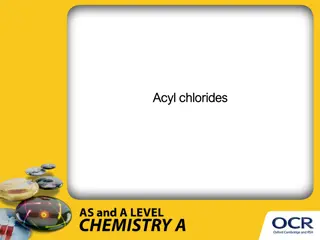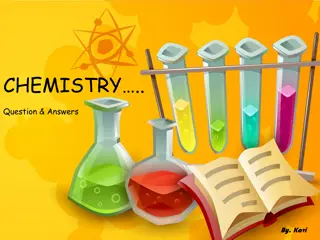Types of groups and reactions
This information discusses electron-donating groups (EDGs) and electron-withdrawing groups (EWGs), their effects on molecule reactivity, examples of each group, nucleophiles, and electrophiles. EDGs increase electron density, making nucleophiles stronger, while EWGs decrease electron density, making
0 views • 14 slides
Overview of Acyl Chlorides in Organic Chemistry
Acyl chlorides, also known as acid chlorides, are important compounds in organic chemistry. They can be prepared from carboxylic acids and thionyl chloride, and are reactive towards various nucleophiles leading to the formation of carboxylic acid esters, primary and secondary amides. Acyl chlorides
0 views • 5 slides
Organic Chemistry Reactions: Electrophilic Addition, Stereochemistry, and Neighbouring Group Participation
In organic chemistry, different types of reactions play a crucial role in modifying compound structures. Electrophilic addition involves breaking bonds to form new ones, stereo specific reactions yield specific stereoisomers, and nucleophilic addition reactions break bonds by reacting with nucleophi
0 views • 21 slides
NUCLEOPHILIC ADDITION REACTION
Nucleophilic addition reactions involve the combination of two or more reactants resulting in the formation of products without loss of atoms. This reaction is guided by the highly polar nature of CHO/C=O groups. The mechanism consists of steps where nucleophiles attack positively charged carbon ato
0 views • 4 slides
Commonly Used Hydride Reagents
Hydride reagents are essential in organic chemistry, acting as bases or nucleophiles toward carbonyl groups. Common hydrides like NaH and LiAlH4 have varying reactivities, with NaH used as a strong base and LiAlH4 as a nucleophile. Handling reactive hydrides requires caution due to potential hazards
0 views • 55 slides




